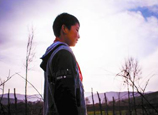
HANGZHOU, July 6 (Xinhua) -- Looking for an unusual spot for an extended vacation or sabbatical? Would you consider spending a few months as a monk at a secluded mountain monastery?
Not many people in China choose to live as monks, which connotes a lifelong abstinence from eating meat and enjoying other carnal pleasures, but a Buddhist temple's program to recruit short-term monks has generated enormous interest among the country's urban residents.
The Ci'en Temple in east China's Zhejiang Province invites both religious and secular men and women to live as monks for anywhere from three months to two years. The program is free, but requires that participants follow the ascetic, vegetarian monk lifestyle.
"The program aims to provide a halcyon period of time for participants, who can enrich and sort out their minds in the process of learning about Buddhism," according to a post on the temple's website.
The program sparked heated discussions after a local newspaper posted the notice on Sina Weibo, the Chinese version of Twitter. It ranked among the website's most discussed topics on Thursday, and the surge in traffic to the temple's website caused it to crash.
"I've always hoped to take a respite from all the pressures and troubles in my daily life, and a tranquil Buddhist temple sounds like a good idea," a microblogger remarked on Sina Weibo.
Master Zhidu, the abbot of Ci'en, said he was surprised by the attention, because "it is common practice for Buddhist temples to invite members of the public to experience monkhood."
"It was initially a small-scale notice for our followers, and the strong reactions are really beyond our expectations," Master Zhidu told Xinhua in an interview.
With seven to eight permanent monks, the temple on the scenic Tiantai Mountain started offering the short-term monk program in 2006. Since then, it has received over a dozen people annually, usually stressed-out urban residents or unemployed people seeking temporary lodging, according to the abbot.
However, this year, over 200 people have applied to the program, including students and entrepreneurs, and most have opted for the three-month term, said a volunteer at the temple in charge of applications.
After being ordained, the short-term monks will embark on a daily routine of chanting sutras, working and performing traditional aerobic exercises, and they will live in the cavernous chambers of the temple.
"There are indeed some temples that offer hotel-style rooms, but we insist on the plain life as well as rigid rules for monks, like bans on alcohol, meat and fish dishes," Master Zhidu said.
The novice monks are allowed to bring mobile phones and laptops with them, so they can stay in touch with the outside world. The temple offers WiFi service, but only at limited times.

















 People enjoy time at old teahouse in Kashgar, NW China's Xinjiang
People enjoy time at old teahouse in Kashgar, NW China's Xinjiang


![]()
